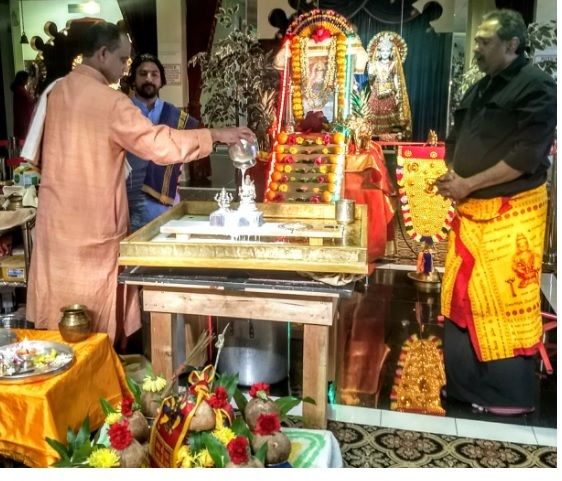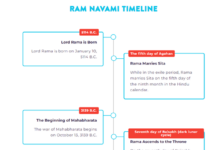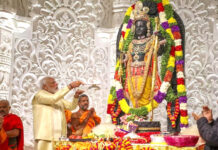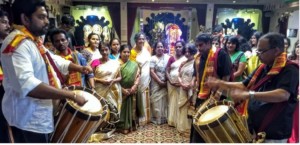 Geetha Patil
Geetha Patil
CHICAGO: The Hindu Mandir of Lake County, Grayslake, celebrated with great enthusiasm the anniversary of Lord Ayyappa Swamy which coincided with the Keralites’ special month “Kadi” on August 4, with hundreds of devotees attending.
In Kerala, they celebrate two seasonal festivals in summer and winter whenever weather changes. They worship on large scale the summer Aadi Month, which falls between mid-July to mid-August and is considered extremely auspicious for performing religious activities and worshipping the divine. Ayyappa Pooja is performed to alleviate effects of Shani transit also.
Lord Ayyappa Swamy is known as Hari-Hara Putra because he emerged out of the union of Lord Vishnu and Lord Shiva to end the conflict between Shaivas and Vaishnavas. He is also known as Manikandan, Shasta or Dharma Shasta because Shastra gives knowledge to preserve and follow Dharma. Ayyappan being Sastava, a Vedic term that also means “Teacher, Guide, Lord, Ruler.”
In the Pathinettapadi (18 divine steps), the first five steps symbolize the five human senses (Panchendriyas) i.e. visual (vision), auditory (hearing), olfactory (smell), gustatory (taste) and tactile (touch). These signify the `mortal’ nature of one’s body. The next eight steps symbolize the eight Ashtaragas: Kama, Krodha, Lobha, Moha, Madha, Maltsarya, Asooya, Dhumb (Love, Anger, Avarice, Lust, Pride, Unhealthy Competition, Jealousy and Boastfulness). The next three steps stand for three Gunas or Thrigunas (nature-born qualities) i.e. Satva, (perspicuity, discernment), Rajas (activity, enjoyment) and Thamas (inactivity, stupor).
The last two steps represent Vidya (Knowledge) and Avidya (Ignorance).It is assumed that after climbing up these eighteen steps reverently in life, one symbolically detaches oneself from all the worldly ties and acquires the Vidya stage.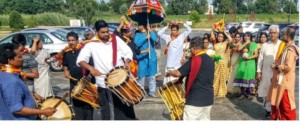
Eighteen is considered as the code number to break into the soul of Nature. The steps represent the 18 hills existing in and around the region of Sabarimala. The significance of 18 can be traced back to the Vedic age. Veda Vyasa’s four Vedas: Rigveda, Yajur Veda, Sama Veda and Atharava Veda have 18 chapters. He also wrote 18 Puranas and 18 Upa-puranas. The Bhagavad Gita and Srimad Bhagavatam have 18 chapters and the Kurukshetra war also lasted 18 days. When one wins over these 18 steps then his Atma becomes one with Paramatma.
Female devotees decked in the beautiful traditional attires carried Kalasham and Abhishekam Samagris from the temple’s gate to the Shrine along with special Kerala drummers. In the entrance, Pt. Anil Joshi welcomed warmly all the devotees. Pt. Ganesh performed Abhishekam of Lord Ayyappa and Yogesh Pandey performed Mantrocharan. Divine Bhajans were sung by the Drummer Team known as “Onkar Group.”
Special Nevedam items were prepared by the sponsored families. Maha Prasadam was distributed by the temple kitchen after Maha Mangal Aarti. This program was very meticulously organized under the guidance of Gopi Menon, who is the senior most founding member of this temple. Menon thanked all the devotees for their active participation.

